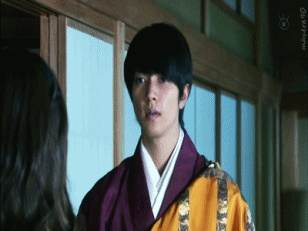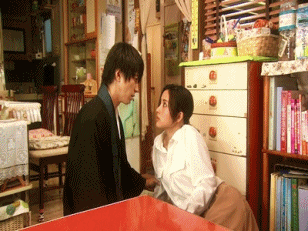|
|
楼主 |
发表于 2014-12-6 18:07
|
显示全部楼层
本帖最后由 corona0911 于 2014-12-6 19:27 编辑
http://eastasia.fr/2014/11/29/haemoo-rencontre-avec-le-realisateur-shim-sung-bo-ffcp/
HAEMOO : RENCONTRE AVEC LE RéALISATEUR SHIM SUNG-BO (FFCP)
Posté le 29 novembre 2014 par Nicolas Lemerle
Entretien avec Shim Sung-bo, le co-scénariste du Memories of Murder de Bong Joon-ho, à l’occasion de l’édition 2014 du Festival du Film Coréen à Paris, où il était venu présenter Haemoo, son premier long-métrage en tant que réalisateur, avant sa sortie en salles en France le 11 mars 2015.
Pouvez vous vous présenter pour les spectateurs français ? Quel est votre parcours professionnel ? Comment est-venue votre passion pour le cinéma ? Comment avez-vous rencontré Bong Joon-ho et comment vous êtes-vous retrouvé à co-scénariser Memories of Murder avec lui ?
J’ai fait des études de littérature française à l’université, mais lire des livres toute la journée est vite devenu ennuyeux, donc j’ai décidé de changer de voie et je suis parti faire des études de cinéma. On était au début des années 90, et c’était une période pendant laquelle les jeunes coréens commençaient à regarder ce qu’on appelle des films d’auteur étrangers. Je me suis rendu compte en regardant ce type de films-là qu’il y avait un autre cinéma que les films érotiques coréens ou les films hollywoodiens. Je me suis dit qu’il y avait quelque chose d’intéressant à faire de ce côté-là et c’est pour ça que j’ai voulu faire des études de cinéma et que j’ai intégré le Korea National University of Arts. A l’époque, Bong Joon-ho était l’assistant de mon professeur principal. Quand j’ai fini mes études, j’ai dû rester auprès de ma mère pendant une année parce qu’elle était malade. Après que ma mère m’ait quitté, je me suis retrouvé avec un ami qui, à l’époque, travaillait en tant qu’assistant sur un tournage de Bong Joon-ho. C’est lui qui m’a permis de le rencontrer en personne. Bong Joon-ho m’a remis des cassettes vidéo de théatre et en échange je lui ai donné mes courts-métrages. On s’est dit que si ça collait entre nous, on travaillerait ensemble, et c’est ce qui s’est passé.
Memories of Murder est sorti en 2003. Pourquoi avoir-mis plus de dix ans pour réaliser votre premier long-métrage ?
En Corée, il y a une certaine façon de devenir réalisateur qui n’existe peut-être pas en France. Quand on commence à être assistant sur un tournage dans le milieu du cinéma, on passe énormément de temps à écrire son scénario et il faut qu’il soit accepté par les plus grands pour qu’on puisse en faire un film. C’est vrai que ça a pris un peu plus de temps que la moyenne, mais ça veut aussi dire que j’ai vraiment bien travaillé le scénario pour qu’il soit réussi. Evidemment, pendant ces dix années, j’ai eu des grands moments de doute, de dépression, de difficultés financières aussi. J’ai également écrit des scénarios sur lesquels j’ai travaillé plus de quatre ans et qui n’ont même pas abouti. On est obligé de passer par ce chemin-là.
Comme Memories of Murder, Haemoo est adapté d’une pièce qui elle-même est adaptée d’un fait divers. Quelles répercussions a eu ce fait divers en Corée du Sud à l’époque et pourquoi l’avoir adapté ?
En ce qui concerne Haemoo, la différence entre la pièce de théatre et le cinéma est encore plus importante que pour Memories of Murder. J’ai fait beaucoup de recherches sur le fait divers de base, sur le contexte historique et sur la vie quotidienne de ces pêcheurs, mais pour moi les éléments qui constituaient la pièce de théatre étaient encore plus importants. Par exemple, dans les journaux de l’époque, on ne mentionne évidemment nulle part cette histoire de relation amoureuse entre la clandestine et le Sud-coréen.
On retrouve certains thèmes proches du cinéma de Bong Joon-ho dans Haemoo, comme la folie ou la monstruosité qui se cache en chaque être humain. C’est quelque chose qui vous passionne ?
Moi-même je pense effectivement que je suis encore dans le territoire de Bong Joon-ho, notamment en ce qui concerne les sentiments refoulés justement, peut-être pas la folie mais tout ce qui a un rapport avec la violence. Mais c’était quelque chose qui était très ancré chez moi avant même ma rencontre avec Bong Joon-ho. Ce sont des choses qui sont en moi depuis très longtemps, sur lesquelles j’ai envie de travailler et que je veux mettre en avant.
On retrouve justement cette monstruosité latente dans le personnage du capitaine interprété par Kim Yun-seok. Comment avez-vous abordé ce rôle avec lui ?
Il y a une puissance et une énergie très particulières que seul l’acteur Kim Yun-seok arrive à véhiculer au public. L’image de Kim Yun-seok que l’on voit dans la deuxième partie du film Haemoo est justement l’image la plus connue de tout le monde, mais si on arrive à découvrir une autre facette de cet acteur, c’est grace à la première partie du film. On le voit comme quelqu’un de très sensible, parfois colérique, des particularités de sa personnalité que l’on n’a pas l’habitude de voir dans les rôles qu’il interprète habituellement au cinéma. J’ai vraiment fait tout mon possible pour accentuer ce côté-là. Et c’est en discutant avec Kim Yun-seok qu’on a décidé de changer par exemple la fin de l’histoire. Dans le scénario original, normalement, le capitaine Kang devenait une part du brouillard marin, provoquant une osmose qui devait capturer le public. En retravaillant mon scénario, et en discutant avec Kim Yun-seok et le reste de l’équipe, on s’est dit que ce serait plus cohérent si le capitaine ne faisait plus qu’un avec son bateau. Je voulais mettre en avant la manière dont il perd peu à peu son humanité.
A part les personnages de Dong-sik et de Hong-mae, on voit tous les autres personnages devenir de plus en plus antipathiques. N’était-ce pas un risque de perdre le spectateur par rapport à l’image donnée de cet équipage dans la première partie du film ?
C’est vrai qu’il y a une grosse différence entre la première et la seconde partie. C’est peut-être dû à mes compétences qui ne sont peut-être pas encore au niveau, mais on ressent effectivement ces différences qui sont assez palpables. Dans la première partie on tourne beaucoup autour de l’humain. Les comédiens disaient même pour plaisanter que ça ressemblait à la croisière de l’amour. Dans la deuxième partie, il y a un événement critique qui vient de se passer et les personnages se retrouvent dans une position où ils veulent complètement couper les ponts avec le passé pour se sortir de là, et chacun fait en sorte d’accentuer son caractère pour aller de l’avant.
Avez-vous privilégié le tournage en mer par rapport au tournage en studio ? Les conditions étaient-elles difficiles ?
La plupart des scènes ont effectivement été tournées en mer. Quand on tourne ce genre de film, on est obligé d’utiliser beaucoup de post-production derrière pour rajouter des effets-spéciaux, mais j’ai essayé au maximum de les minimiser. C’est peut-être pour ça que l’on ne voit pas le bateau virevolter complètement dans l’océan. En contrepartie, le côté très naturel permet au public de se focaliser sur les personnages, au lieu d’être obnubilé par le décor de la mer et du bateau, parce que, de toute manière, le public est souvent focalisé sur les effets de post-production, que ce soit bien fait ou mal fait. Et c’est vrai que tourner en mer non-stop était physiquement très difficile, très fatigant. L’équipe n’en pouvait plus, certains avaient même le mal de mer donc c’était vraiment épuisant.
Justement, est-ce que cette méthode où il faut se piquer le doigt pour faire passer le mal de mer marche réellement ?
C’est une scène qui existe aussi dans la pièce de théatre et je trouvais que ça collait très bien au personnage de Dong-sik, donc je l’ai reprise pour essayer de mettre en avant le côté accueillant et affectueux du personnage. Je ne sais pas si cette méthode fonctionne mais tous les Coréens en ont l’habitude depuis qu’ils sont gamins. C’est une « recette de grand-mère », donc quand on mange quelque chose qui ne passe pas, nos grands-mères nous caressent le bras en nous mettant un bout de ficelle au bout du doigt pour empêcher le sang de passer, ensuite elles nous piquent avec une aiguille pour faire partir le sang noir. Après on se sent bien parce qu’on arrive à faire un rot.
La photographie de votre film est très belle. Comment s’est passée votre collaboration avec Hong Kyung-pyo, qui a aussi travaillé avec Bong-Joon-ho sur certains de ses films ?
Peut-être qu’il n’est pas très connu à l’international, mais Hong Kyung-pyo est très connu en Corée. C’était vraiment mon premier choix. Ça ne pouvait pas être quelqu’un d’autre que lui, tout simplement parce qu’il n’y a pas beaucoup de personnes capables de gérer ce genre de film. C’est quelqu’un qui, de base, a une connaissance inouïe de la mise en scène, et c’est aussi la seule personne qui maîtrise les tournages en mer, tout simplement parce que Hong Kyung-pyo a déjà participé aux tournages des films Typhoon et Phantom: The Submarine. Il a un savoir-faire qui est inégalable par rapport aux autres et c’est donc pour ça que je l’ai choisi.
On demande à chaque réalisateur de nous citer une scène ou un film qui l’a marqué ou inspiré, quel serait votre moment de cinéma ?
Est-ce que je peux en citer deux ?
Allez-y !
Dans le film Fargo, il y a une scène où Steve Buscemi est en train de perdre son sang sur la neige, avec son sac rempli d’argent à côté de lui. Il y a une superbe musique qui illustre cette scène. C’est un personnage qui n’est pas vraiment glorieux, qui touche le fond, mais c’est contrebalancé par une musique majestueuse, orchestrale. Ça m’a vraiment donné la chair de poule et j’en ai pleuré. Dans le film La Vengeance est à moi de Shôhei Imamura, la scène où le personnage principal est obligé d’étrangler cette femme alors qu’elle l’a caché en sachant qui il était, m’a vraiment bouleversé.
Avez-vous un dernier mot pour nos lecteurs ?
(En français) Notre équipe a fait beaucoup d’efforts en hiver dernier pour ce film. On pourra ainsi éprouver le sentiment triste de découvrir le désir fondamental de l’être humain… j’espère ! Bonne séance, au revoir.
Propos recueillis le 29/10/2014 à Paris par Nicolas Lemerle.
Photo : Flavien Bellevue.
Traduction de Kim Ah-ram.
Merci à Céline Petit et Clément Rébillat.
Haemoo, de Shim Sung-bo. Corée. 2014. En salles le 11/03/2015.
http://allons-au-cinema-avec-tom ... ew-shim-sun-bo.html
Interview: Shim Sun Bo
3 Décembre 2014, 17:46pm | Publié par Tommy's Ghostwriter
Shim Sun Bo signe avec Haemoo sa toute première réalisation. Et pas n'importe laquelle (voir critique) En effet ce film n'est autre que celui choisi par la Corée pour représenter le pays aux Oscars 2015 ! Bien que le cinéaste trouve la situation encore prématurée pour d'éventuels pronostics, il reste très content de cette nomination qui -il l'espère- touchera le public américain par son sujet international.
En quoi le sujet de l'immigration vous touche-t-il ? Pensez-vous que cette histoire pourrait se passer réellement ?
Je ne considère par mon film comme axé sur l’immigration mais plutôt sur une situation compliquée du genre humain, Vous savez le peuple sino-coréen a été dispersé suite à la colonisation par la Japon de la Corée et de la Chine. Ce sont pour moi trois peuples identiques mais vivant dans trois pays différents. Par ailleurs la province où ils vivent possède un régime indépendant très proche de la Corée. C'est plus une sorte de "retour au pays" avec des gens comme vous et moi qui veulent se réunir, survivre et mener leur vie à bien.
A part le héros, les marins sont touts un peu fous et antipathiques, pourquoi les avoir voulus comme ça ?
Je ne dirais pas qu'ils sont fous mais je voulais créer des personnages représentatifs du désir humain, en particulier des péchés capitaux. Toutefois je voulais que le spectateur ressente une certaine empathie pour les personnages. J'ai pensé le bateau comme une métaphore de la société dans laquelle on vit.
Le pire arrive toujours ne laissant aucune porte de sortie aux personnages, les personnages dégoûtent, pourquoi ?
Je ne veux pas qu’ils soient tous considérés comme des monstres. Ce que je voulais exprimer c'est qu'en fonction des éléments particuliers, de circonstances extrêmes, on peut prendre des décisions nous amenant à des comportements violents (ce qui ne serait pas forcément le cas dans une situation normale).
Shim Sun Bo au FFCP
J'aurais aimé avoir des précisions sur la façon dont vous avez tourné en mer ?
Nous avons essayé de tourner en mer le plus possible. Nous nous sommes concentrés sur des gros plan sur les personnages pour que cela paraisse parfois plus naturel. Je préfère garder secrets les passages qui ont été retouchés par ordinateur pour ne vas vous gacher le plaisir cependant.
Une scène m’a beaucoup marquée par la puissance de ses émotions, le personnage féminin a un comportement ambigu, lorsqu’elle couche avec le héros que ressent-elle vraiment à ce moment là, plutôt de l'amour ou bien de la peur ?
Ce qu’elle ressent à ce moment-là est un mélange de trois émotions. Premièrement un meurtre vient d’être commis sous ses yeux, elle ressent de la peur et réalise donc que le seul moyen pour elle de s’en sortir c’est de se rapprocher (physiquement) du seul marin encore sain d’esprit. En même temps je pense qu’elle éprouve aussi des sentiments amoureux pour le héros mais aussi et surtout elle se sent aussi coupable car (je ne sais pas si vous l’avait remarqué car la scène est très sombre mais) elle vient en fait de mordre la main du héros lorsque celui-ci lui couvrait la bouche.
Pouvez-vous citer des films qui vous ont marqués ou qui vous ont donnés de l’inspiration ?
Je dirais Fargo des frères Coen en ce qui concerne les relations entre les personnages mais également au niveau de la musique, de l’ambiance et du point de vue. Mais je n'ai pas d'inspiration particulière en ce qui concerne l'histoire en elle-même. |
|

































